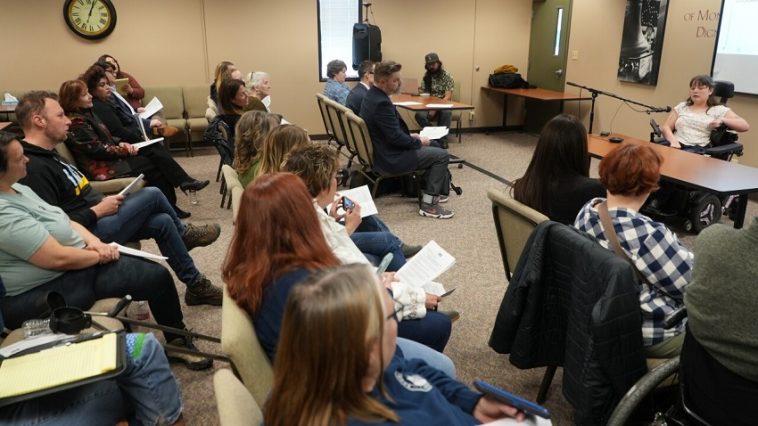Missoula, MT – Disability rights advocates gathered in Helena on Monday to voice their concerns over a federal lawsuit they believe threatens the foundation of disability protections in the United States, particularly Section 504 of the Rehabilitation Act.
The lawsuit, filed by 17 Republican state attorneys general, challenges a rule by the Biden administration that would add gender dysphoria as a protected condition under Section 504. Advocates argue, however, that the case could have far-reaching implications for the rights of people with disabilities and the programs that support them.
At a news conference organized by Disability Rights Montana, advocacy organizations urged Montana Attorney General Austin Knudsen to withdraw the state from the lawsuit, which they believe could erode vital disability protections. David Carlson, executive director of Disability Rights Montana, emphasized the importance of Section 504 and its role in ensuring equal access to services for individuals with disabilities.
“Get out of the case: It’s that simple,” Carlson said, expressing his concern that the lawsuit could jeopardize critical laws that many people with disabilities depend on.
Section 504 requires any program receiving federal funding to provide equal access to individuals with disabilities. While the provision is widely recognized for its role in creating “504 plans” in schools to support students with disabilities, advocates argue that its reach goes far beyond education and is foundational for many aspects of life for people with disabilities.
Opal Besaw, a writer and activist from Kalispell who has spastic quadriplegic cerebral palsy, spoke at the conference about how Section 504 has been instrumental in her ability to live a fulfilling and independent life.
“504, really when it comes down to it, is what allows me to live and be a person who can exist and be productive and contribute to society in a way that’s meaningful to me,” Besaw said.
Jacob Krissovich, advocacy and public policy chair for the National Federation of the Blind of Montana, echoed concerns about the broader implications of the lawsuit. He pointed out that Section 504 predated the Americans with Disabilities Act (ADA) and remains a crucial piece of disability rights legislation.
“So my question to you is, what happens to the rest of those laws if this is stripped away?” Krissovich asked.
Following the news conference, advocates delivered a letter to Knudsen’s office, urging him to withdraw Montana from the lawsuit. However, Emilee Cantrell, a spokesperson for Knudsen, disputed claims that Section 504 was under threat. She argued that the lawsuit was focused solely on a Biden administration rule that expanded protections related to gender dysphoria and did not seek to undermine Section 504 itself.
“Bad faith actors are deliberately misconstruing this lawsuit nine months after it was filed to frighten parents into believing that the Attorneys General put Section 504 in jeopardy,” Cantrell said in a statement to MTN News. “That is categorically false.”
The lawsuit, led by Texas Attorney General Ken Paxton, challenges a rule from the Department of Health and Human Services that would extend protections to individuals with gender dysphoria under Section 504. The attorneys general contend that this expansion of protections is unconstitutional, arguing that the Rehabilitation Act, which includes Section 504, should not apply in such cases.
In a recent filing, the state attorneys general clarified that their goal was not to declare Section 504 unconstitutional, but rather to challenge its application to federal funds not authorized by the Rehabilitation Act. The attorneys general also noted that the Biden administration had already begun to reverse some of the policies related to gender, and they suggested the case may be put on hold as a result.
Cantrell reiterated that the lawsuit was intended to protect students with disabilities in Montana and prevent federal policies from forcing schools to prioritize what she described as “radical gender ideology” over the needs of students with disabilities.
Scott Birkenbuel, CEO of Ability Montana, remained unconvinced, emphasizing that the language of the lawsuit still posed a significant threat to Section 504. Birkenbuel said that despite the state’s assurances, the advocates would continue to monitor the case closely.
“They are trying to tear it down, and they’ve not made any statements to make me think otherwise,” Birkenbuel said. “We’re going to stay vigilant.”
The advocates’ concerns are rooted in the long history of activism that led to the passage of Section 504. In 1977, disability rights activists staged a 26-day sit-in in San Francisco to push the federal government to enforce Section 504. Besaw referenced this historic protest as she called on the current generation of activists to protect the progress made over the past several decades.
“If this law is to go away, we are disgracing the work that those 200 activists have done,” Besaw said.
As the case continues to unfold, advocates remain focused on ensuring that disability protections remain intact. While some speculate that the case may ultimately be resolved as the Trump administration’s policies are reconsidered, others are preparing for a prolonged fight.
A federal judge in Texas has agreed to keep the case on hold, with the next update scheduled for April. Disability rights groups say they will continue to monitor the situation and push for protections that ensure equal access for all individuals with disabilities.



